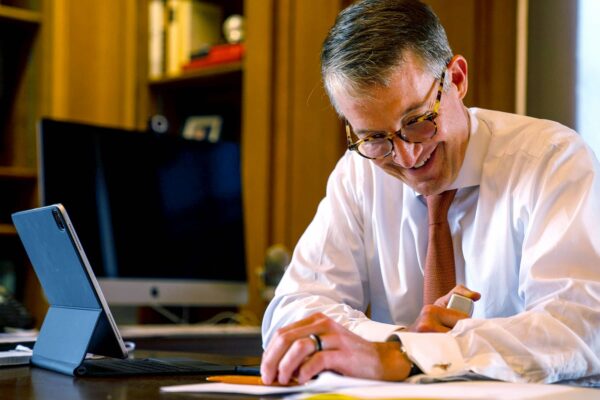When Jay Hartzell was in high school and his parents asked what he wanted to be, he said, “a professional student, because I enjoy that and I’m pretty good at it. If it could pay, that would be a pretty good deal.” Being a professor was about as close to “professional student” as one can get, he says. “Now I’ve screwed it up and have this job where I wear a tie.”
The quip is signature Hartzell — low key and approachable, likeable and clever. (Asked where he was born, he replies, “Yeah — this now feels like you’re trying to cypher out my passwords.”) His arrival in the Office of the President at age 51 signals the passing of the torch from the baby boomers to Generation X: Whereas his predecessor cited the Who as his band of choice, Hartzell opts for a blend of ’90s alternative fare (“If it were an XM channel, it would be Lithium, so Green Day and Weezer”) and Texas singer-songwriters like Lyle Lovett, Robert Earl Keen and Bob Schneider.
In charge but kind, practical yet visionary, self-deprecating and funny — Hartzell’s sunny disposition plays well during these troubling, disorienting times for The University of Texas at Austin. Even his resting face projects calm and friendliness.
Born in Topeka to a sportswriter father and a pianist mother, Jay moved to Tulsa when was 2. “I’m the part of the family that has no real artistic skills. Dad was a writer, mom was a pianist, my brother’s a painter, and my sister’s a pianist. I’m from some other strain of genes. I’m not sure what happened.”
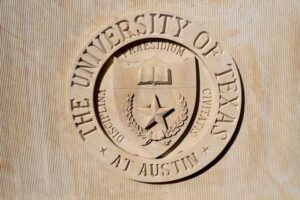
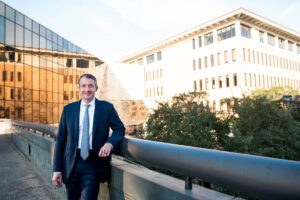
Going to work with his dad meant going to baseball games and other sporting events. Jay played baseball, basketball and tennis. Though he claims not to have been good enough to compete much beyond high school, he’s kept up tennis and tried to add golf, though the higher he’s climbed in administration, the less he gets to play of anything. Tennis, however, serves a special purpose: “As my jobs have gotten more complicated, the stress release given by hitting a little yellow ball has become more and more valuable.”
He applied to only one college, Trinity University, and initially chose engineering, “because I was OK at math, and they told people who were OK at math they should be engineers.” But cold feet about engineering as a career, and an introductory economics class that he loved, caused him to switch to economics, then add finance as a second major, which he calls “just economics with numbers.”
Graduating with a B.S. in business administration and economics, he then came to UT for a Ph.D. in finance in 1998. From there, he and his wife, Kara, were off to New York, where he taught at NYU. “It was a great gig,” he remembers. “It’s a wonderful place to teach finance because it’s in the middle of it all.” But, he adds, “It’s a hard place to live. I was commuting in from New Jersey. We had two little kids. My wife frankly was pretty miserable. She would ask me over dinner, ‘Where else can we end up?’” Hartzell never even dreamed of returning to Texas because one doesn’t tend to get tenure-track teaching offers from the university where one earned a Ph.D. “When Texas called, I hung up the phone and she had already packed.”
When Texas called, I hung up the phone and [my wife] had packed.”
Hartzell returned to UT and the McCombs School of Business in 2001, where he began a steady rise through the administrative ranks: executive director of the McCombs School’s Real Estate Finance and Investment Center, chair of the Finance Department, senior associate dean for academic affairs, and, five years ago, dean. All the while, he pursued research on real estate finance, corporate finance and corporate governance. “Human capital and the supply of religion” is one intriguing title plucked from his long list of published articles. Another is “Market Reaction to Public Information: The Atypical Case of the Boston Celtics.”
One feature of his years as dean that was good preparation for the future was helping create partnerships with colleges and schools across campus including the Dell Medical School, fine arts, liberal arts, natural sciences and communication.
Another harbinger of things to come was his establishment of the position of associate dean of diversity and inclusion and the McCombs Diversity and Inclusion Committee.
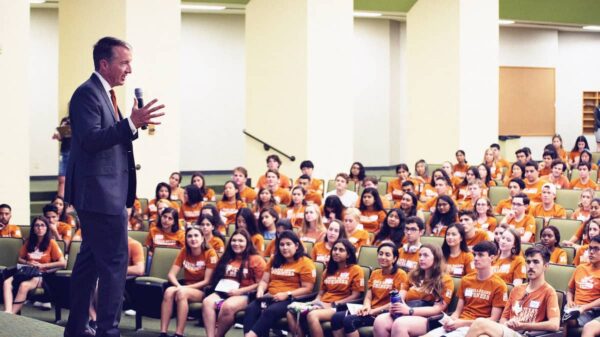
In May, after a shocking whirlwind of weekend phone calls from the Tower and from regents, and with the campus still shut down from the pandemic, he was named interim president. “I’m very grateful for all the time that [then-President] Greg Fenves took with me to get me prepped. We had a bunch of hour-long conversations topic by topic. It was COVID time, so he was walking around Austin, and I was just listening on my phone, taking notes and thinking about things. He spent a lot of time in particular around things like Dell Med and the UT Health, athletics, and the political landscape — stuff that was not in my sphere in the same way as dean.”
“I get the award for facing the crappiest start,” he says with a laugh. “My mentality in those early days was just, ‘What’s the next meeting? And what’s the next problem? Can we make any progress on it? OK, move that aside. Next.’
We have mainly had to just take the problems as they come and try to knock 'em out.”
“As the summer went on, we started to be able to look up at the horizon a little more and figure out where we were aiming. But a lot of it has been just hour by hour, problem by problem, trying to make progress and not getting too fixated on the idea that we haven’t been able to sit back and think deep thoughts too much. We have mainly had to just take the problems as they come and try to knock ’em out.”
Another big chunk of time was spent getting to know the team. “There were a lot of people I knew from meetings, I knew by email, but I hadn’t spent much time with, so I was trying to build an early rapport and shared understanding with the team, and they were tremendous as well.”
In September, following a tumultuous summer that added nationwide calls for racial justice to a plate already brimming with crises, he was named president.
We spoke in early October.
How has UT changed in the years you have been here?
In many ways, UT has mirrored the changes in Austin. Just like Austin is now more central in the national, international conversations as a one of the leading cities, I think UT has risen in at least brand and reputation. It feels like we’re more in the mindset of people nationally than we used to be as a brand. There’s still work to do there, but as Austin has gotten more hip and famous, or at least famous for being hip, UT has benefited as well. It feels easier to recruit students and faculty here than it used to be because they think of us as more of a preferred destination than they used to. It’s part of what makes us special. In business language, it’s what’s differentiable. We’re in Austin, Texas. That’s special. That’s not Ithaca, right? It’s not Iowa City.
We have incredible fundamentals. When you think about how we’re different from other colleges and universities, we’re in Texas, which is a great benefit. People are moving here. They want to live here. It’s a talented, diverse, large state. And we’re in the best city in the state, where people really want to live and come to school or come to work.
We’ve got this alumni base of 500,000-plus living alums, just a huge platform for doing things.
And then you think about all the trends in the U.S. around technology, innovation, AI and machine learning, data — UT is really strong in all those fields. Those feel to me like tailwinds we can take advantage of. Where does the world seem to be heading? And how can we lay those two together? I think we can continue our rise that we’ve been on.
What are you excited about?
When I was dean, we had Eddie Reese, our amazing swimming coach, come speak, and he said, “There are no great places — there are great people.” I’m excited first and foremost about the people I get to meet. I had a week as interim where I talked to Darren Walker at the Ford Foundation, Brené Brown and Rex Tillerson. That’s a pretty good week! Those are all our people, and they’re all fantastic in their own fields and in their own ways.
I’m looking forward, once we get past the COVID stuff, to getting back to a full football stadium, walking through campus when it’s really buzzing again, a full room of faculty where we’re all able to shake hands and maybe hug a little — those kinds of things I’m looking forward to a lot.
Over the next year, I’m interested in embarking on more conversations among our community about our core values. What do we think it means to be a Longhorn at every level — faculty, staff, students, alums? There’s something to our culture that’s true and special, but I’m not sure we’ve always taken the time to pause and articulate it. If we take a little bit of time to think through it, to talk about it together, and to listen to each other, I think it may help us find and enjoy what we have in common. It may help us when we recruit people. It may help us retain people and, as we invest in the university, focus on the things that make us special and make sure we protect those things. That’s something that spans staff and faculty and really all of campus.
For example, with all of the controversy over the summer and all the concerns over racial injustice, I think we should be comfortable saying we want to be an inclusive, welcoming environment for all people, and that’s it. That should be a value of ours, right? And I think it is, but should we say it more? Should we talk about it more? Should we listen to each other more about it?
I’m also worried about all the polarization going on. Let’s focus on what we have in common, and let’s talk about our shared future as a university. That has a lot of optimism built into it — all the great things we can do together rather than worrying about the things that differentiate us.
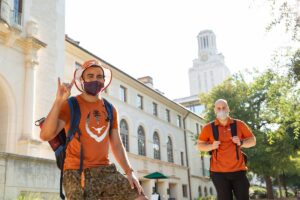
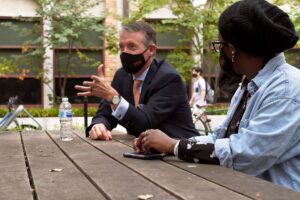
Having a long history is a double-edged sword. We have all these rich traditions, but perhaps some of those traditions age better than others. How do you think about the value of progress and the value of tradition? How do you thread that needle?
“The Eyes of Texas” is an example of that. The key to me is how we use those traditions as things that bring us together but then make them forward-looking. Take our slogan: What starts here changes the world. We want to produce amazing students who go out and change the world. We want our faculty to change the world. We want our staff to change the world. So can we use those traditions as ways to get more leverage, more impact, more commonality, so that you’re supporting that person across the hall a little differently because you have something in common?
Tradition should be unifying and then forward-looking, and not just a dusty memory — not, “Remember when we were 18 and we were staying up late doing all kinds of things we shouldn’t have done at the time?” The power of tradition is when you see somebody walking down the street who’s wearing burnt orange and you do the Hook ’em sign, then there’s a shared experience there that can open a door, can make a connection. But it’s about what they can do for your future, not just what they did in the past.
Is your philosophy one of continuous incremental improvement or do you see opportunities for us to make quantum leaps in certain areas?
I don’t see dramatic course corrections, but a renewed focus on excellence. We’re not going to turn into the University of Phoenix or dramatically change the direction of the university. But I have seen and I think we’ll continue to see things that in hindsight look like jumps. When I was chairing the Finance Department, we started the first dedicated specialized master’s program under a new model for the school. I think it’s No. 3 or 4 in the country now, and marketing was just ranked No. 2 or 3. We have four or five of these programs now, so it’s turned into a portfolio, so it looks like this big move, but at the time, it was one new program with 25 students. At the same time, depending on the day, it’s, well, what’s my 11 a.m.?
Do you think every high schooler should go to college?
Because I come from finance, I think about this like a portfolio. We shouldn’t want everybody to look the same. And that’s the way I feel about the university and about society. I do think we need to provide the opportunity for everybody to learn, to get skills, to develop in their careers, but as a society, we’re going to need extremely skilled people in certain dimensions that may not require a degree. I would expect and imagine that there are electricians who lead wonderful, fulfilling lives, and we need electricians. As a society, we should embrace that and not look down on it. We should think, cool! That’s great!
Our role as the flagship should be training the leaders of the state, the country, our fields. But that’s a luxury as we sit in the flagship, and lots of people can find other ways to find their passion and lead a happy life.
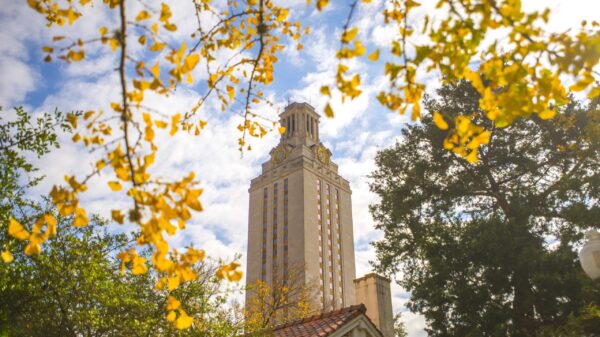
That said, how would you pitch college to an 18-year-old who wasn’t sure about the value of it? Is it worth the money? Is it worth the time? What is the case for college?
It depends what connects with the person. If you are pitching to the rational economist, you’d say that the difference in lifelong earnings between a college graduate and non-college graduate is very big and is as wide as it’s ever been. So there’s an economic case for the return on investment.
For students who don’t know what they want to do and are trying to figure out where their passions are, what better environment than one where you get to sample a huge, broad, and, in our case, very deep university, find what you love to do and let it take you somewhere? There is a part of college that is expanding your mind, opening doors, and trying to find your passion.
Then there’s a third element that many of our students excel at, which I would call the social element, and that’s much of why I love UT and what I missed at NYU. When I recruit students, this is the part I call “the full college experience,” and it’s everything from the parties — hopefully post-COVID — to the football games to the museums to the coffee shop discussions about esoteric, weird things. We take a bunch of high school superstars and put them in a room with each other, and pretty cool conversations start to happen. So there’s this spontaneous interaction social piece.
Those are three different layers: the rational argument you should go; you’re going to find your passion and you’re going to be a happier person as a result; and what’s more fun than finding five other people that you have something in common with, even if it’s just that you all somehow ended up at UT?
What is the case for the research university, the differentiation, as you say, of a research university over a really good four-year teaching college?
I’ve felt this. I had a wonderful experience at Trinity, and it was great for me. My high school was not very good, and I don’t know if I was in the mindset to be successful at a place like UT. In my case, a small, teaching-oriented school was a really good fit.
But then coming here as a student, you’re getting more faculty on the cutting edges of their discipline. That will sneak itself into the classroom in different ways, and it may not be obvious to the students at times, but the fact that the faculty are on those edges will change the way that classes go and the way discussions go. I saw this in business. I’ve seen it in economics. I’ve seen it in lots of fields.
As a student, if all of a sudden you’re super excited about how to use solar power to generate and drive autonomous vehicles, a research university is going to have more faculty ready to talk to you and engage with you on those issues, especially a university of our scale, than a teaching university in general.
For a society, a research university has the ability to deploy a bunch of extremely talented people to work on problems we’re facing. Sometimes, of the things our faculty are working on, we’re not always sure what’s going to pay off. It’s easy to point to the things that didn’t pay off as if we shouldn’t have invested in those, but that’s kind of cheating because you’re looking back, and you just never know.
And so COVID-19 hits, and we’ve hired Jason McLellan, one of the world’s experts in coronaviruses. We could argue that coronaviruses were probably important globally, but not like this one. And because we have him in a top research university with an incredible lab and facilities, he’s able to model out the spike protein within a month. But it took having a Jason McLellan, with a lab, with the microscopes, working on that area so that when something hit society that we wanted to address, we had somebody who was an expert in that. That happens at research universities in a way that doesn’t happen in other places, just because people’s attention and time is spent differently.
It's not just training the next captains of industry, [...] but really people who are going to make Austin and Texas and the U.S. better in some fundamental ways.”
Many private universities are great research universities. What is it about being a public university that makes us special?
As a student coming here, you’re getting what is probably the best value in the country. I know it’s not as cheap here as when we came, but something like $12,000 a year is just an amazing deal compared to the privates. Because of that, our doors are open to more people, and they leave with less debt. They’re able to follow their dreams and make a difference in the world without being saddled by some of those financial obligations they would otherwise have incurred. So there is an element from what I would call the consumer side or the student side to this.
From the institution’s side, because we’re getting this support from the state, it gives us a really noble mission. It’s not just training the next captains of industry, just the next generation of CEOs, but really people who are going to make Austin and Texas and the U.S. better in some fundamental ways. One other part of that is we have a different obligation to attract talent from every place in the state, people who deserve to be here, and make sure they know we want them to come, that they can afford it, and they’ll thrive here. The private model doesn’t lend itself the same way to this idea that not only should students from Houston, but also from the Valley and Dallas and Amarillo and Lufkin — those best and brightest from everywhere — should want to come here, and we should set them up to succeed.
—with additional reporting by Cindy Posey and Gerald Johnson

